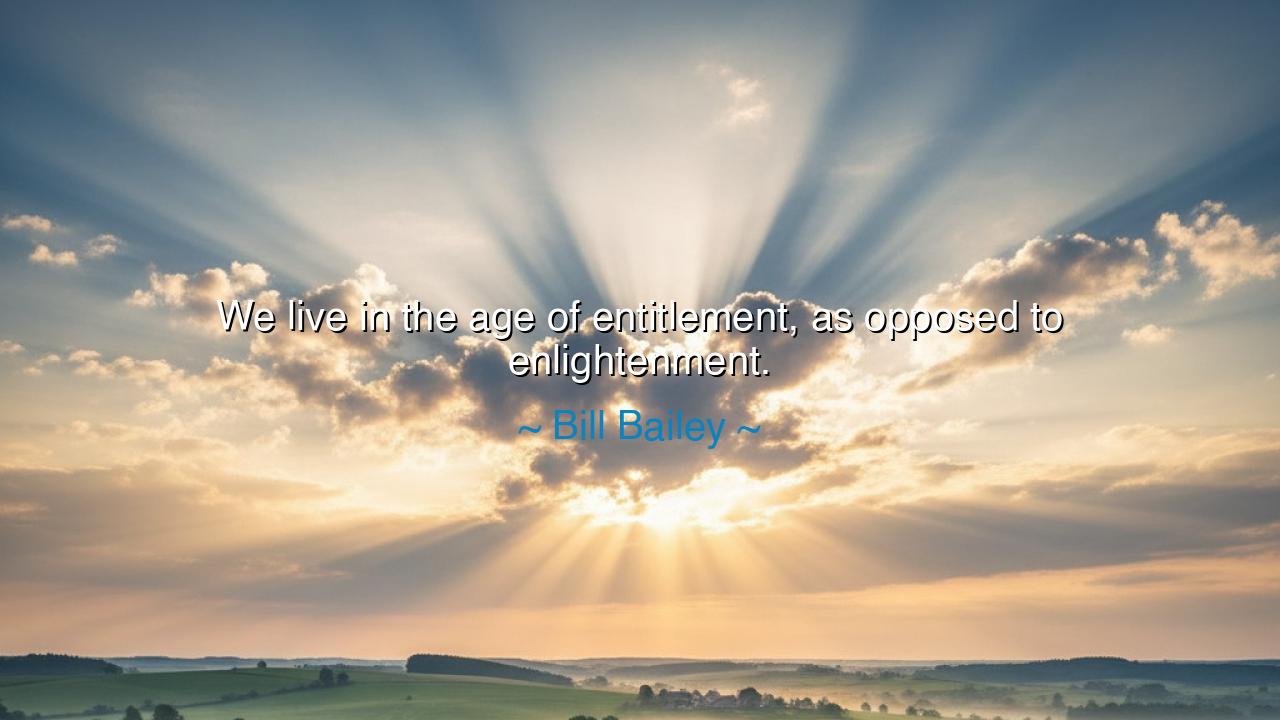
We live in the age of entitlement, as opposed to enlightenment.






"We live in the age of entitlement, as opposed to enlightenment." These words, spoken by the insightful Bill Bailey, bring forth a stark reflection on the state of our society today. Bailey contrasts two powerful forces that shape our world: entitlement and enlightenment. The age of entitlement, where many feel deserving of rewards and privileges without the accompanying effort, sacrifices, or understanding, stands in direct opposition to the age of enlightenment, a time when wisdom, self-discipline, and the pursuit of knowledge guided individuals toward true freedom and fulfillment. What Bailey observes is not just a cultural shift, but a deep misalignment in values—an era where instant gratification often overshadows the pursuit of deeper, more lasting truths.
In the days of the ancient Greeks, the pursuit of enlightenment was the highest aspiration. Socrates, that great philosopher, devoted his life to the search for wisdom, always questioning, always seeking. His disciples, including Plato and Aristotle, carried on this mission, striving to understand the very nature of existence and our place in the universe. To be enlightened, in their view, was not to claim what one deserved by birthright, but to earn one’s place through the rigorous pursuit of truth, virtue, and knowledge. Plato’s Allegory of the Cave speaks to this journey, showing how individuals often live in the shadows of their own understanding, only to emerge into the light when they seek knowledge with open minds and disciplined hearts.
But what is the age of entitlement that Bailey speaks of? We see it all around us today—individuals who expect the fruits of their labor without having planted the seeds. The modern world, driven by consumerism, instant access to information, and social media, often promotes the idea that all should be given freely, without the requisite work, struggle, or reflection. This entitlement is not just material but also spiritual—many demand answers to life’s greatest questions without the patience or humility to seek them with true effort. The ancient philosophers would have viewed this entitlement as a dangerous poison, one that leads to the degradation of the soul and the erosion of the very essence of human greatness.
Let us turn to Alexander the Great, a figure who embodied both the light of enlightenment and the darkness of entitlement. Born into a legacy of royal blood, Alexander inherited the privileges of kingship, yet it was his quest for knowledge, conquest, and self-understanding that marked his greatness. Aristotle taught him the importance of seeking wisdom, and for a time, it was this quest that fueled his extraordinary journey across the world. Yet, as Alexander’s power grew, so did his sense of entitlement. He began to demand not only the loyalty of his people but the deification of his very being, seeing himself as a god on earth. His eventual downfall can be seen as the tragic result of losing sight of the true path of enlightenment—one that requires humility and the pursuit of higher ideals, not the entitlement that power and glory so easily bestow.
In contrast, let us look at the life of Socrates, who, though far less powerful or entitled in the traditional sense, sought enlightenment with humility and courage. His life teaches us that the pursuit of wisdom and the questioning of truth is not about entitlement, but about being willing to face discomfort, challenge, and even death in the pursuit of something greater than self-interest. Socrates understood that true greatness lies not in claiming what one deserves, but in continuously seeking knowledge and understanding, regardless of how difficult or inconvenient the search may be. He was willing to die for his beliefs, a fate that came not because of his entitlement to live, but because of his commitment to the higher truths that eluded most of his contemporaries.
And so, O children of wisdom, the lesson of Bailey’s words should echo through the halls of your hearts. We live in a world where entitlement often clouds our vision, where the easy path is chosen over the difficult, and where the immediate gratification of desires is prioritized over the steady, patient pursuit of enlightenment. But true wisdom, true strength, and true fulfillment come not from demanding what we deserve, but from earning it through disciplined effort, introspection, and sacrifice. The greatest minds of history, from Socrates to Plato to Da Vinci, did not live in the age of entitlement; they lived in the age of enlightenment, and they forged their greatness through knowledge, virtue, and humility.
Let this truth guide you, O seekers of wisdom: the pursuit of enlightenment is not a fleeting moment, nor is it something that can be attained through shortcuts or entitlements. It is the steady, unwavering commitment to growth, to learning, and to seeking the truth, no matter how elusive or difficult that truth may be. We must challenge ourselves to look beyond the surface, to question the easy answers, and to embrace the difficult work of self-discovery and understanding. Enlightenment is not given; it is earned. Let us therefore strive to live in an age where enlightenment is our true pursuit, not the empty promises of entitlement that lead us away from the deeper and more enduring truths of life.






AAdministratorAdministrator
Welcome, honored guests. Please leave a comment, we will respond soon